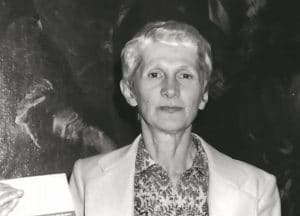Gebrek aan wortels en ouderlijke liefde tekent een mens voor het leven, laat Marina Jarre zien in haar autobiografie Verre vaders.
Welverdiende plek in de literatuur
Waarom wordt Marina Jarre, behalve door een aantal kenners, niet beschouwd als een van de grote schrijvers van het naoorlogse Italië? Dat vraagt collegaschrijfster Marta Barone zich af in het voorwoord bij Jarres autobiografie Verre vaders, die haar voormalige stadsgenote (ze woonden allebei in Turijn) graag haar welverdiende plek in de Italiaanse literatuur wil teruggeven. Zelf gaf de in 2016 overleden Jarre als verklaring dat wat ze schreef nooit leek te passen in de tijd.

Dat is ook het beeld dat oprijst uit Verre vaders: Jarre was iemand die, onbedoeld, altijd nét uit de pas liep. Uitgerust met een scherp analytisch inzicht in menselijk gedrag, maar ook met een onvermogen om de sociale regels en codes te begrijpen, zei en deed Jarre altijd precies het verkeerde. Als kind al was ze iemand die het in de ogen van anderen, vooral die van haar moeder, nooit goed kon doen.
Jarres autobiografie, volgens Barone een van haar belangrijkste boeken, is een poging haar verleden te reconstrueren en grip te krijgen op haar complexe afkomst en identiteit.
Ze werd geboren in Riga als oudste dochter van een Letse joodse man en een Italiaanse protestantse vrouw met Franstalige grootouders. Als haar ouders scheiden stuurt hun moeder Marina en haar zusje Sisi naar hun Italiaanse grootouders in Torre Pellice, ten zuidwesten van Turijn. In een week tijd verandert de dan 10-jarige Marina van land, taal en familie. Haar moeder komt aanvankelijk alleen in de vakanties naar Italië; haar vader wordt in 1941 vermoord.
Als een spin in een web
Tastend maar minutieus schrijft Jarre een fascinerend persoonlijk relaas vol universele thema’s als familiebanden, tijd, herinnering en identiteit. Bovenal is het een schrijnend portret van moeilijke moeder-dochterrelatie.
Marina’s moeder kan haar oudste dochter niet accepteren; terwijl Sisi voortdurend de hemel in wordt geprezen, wordt Marina uitgemaakt voor lafaard en leugenaar, en meet haar moeder ten overstaan van iedereen die het maar horen wil Marina’s slechte eigenschappen en zwakke karakter breed uit. Dat ze goed is met cijfers en pijlsnel 2340 kan vermenigvuldigen met 2500 wordt niet als verdienste gezien.
Zo groeit Marina op tot een meisje dat voortdurend achteromkijkt zodat ze, mocht ze ergens worden achtergelaten, zelf de weg naar huis weer kan vinden. Een vrouw die ook als volwassene nog steeds hunkert naar de waardering van haar moeder en niet weet wat ze aan moet met de zinderende woede die de voortdurende afwijzing en vernedering in haar oproept.
Als een spin weeft ze een beschermend web om zichzelf heen: ‘Ik moet zo weinig mogelijk van mezelf toevertrouwen aan de anderen, die proberen me stukje bij beetje kapot te maken.’
Alleen in haar fantasie en de literatuur vindt deze ‘eenzame onaanraakbare’ een veilig thuis.
Hoe tragisch ook, gelukkig kon ze daar wél heel mooi over schrijven.
Marina Jarre, Verre vaders. Vertaald door Philip Supèr. Wereldbibliotheek, 224 p., € 22,99
